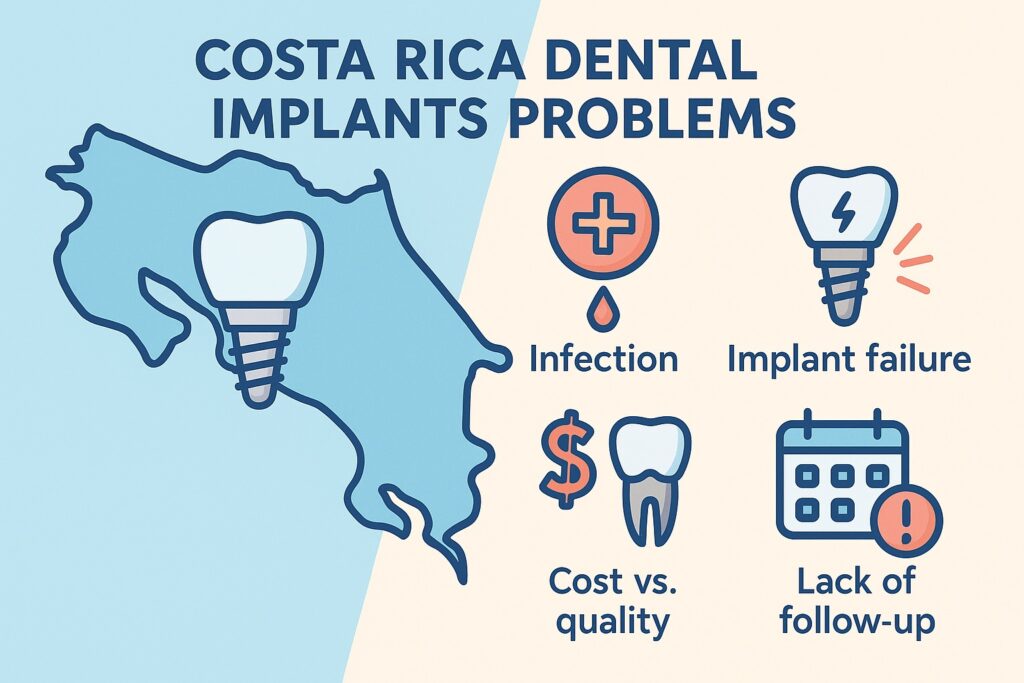Costa Rica has become one of the most popular destinations for dental tourism, especially for patients from the United States and Canada seeking affordable dental implants. With prices often advertised at 50% to 70% less than in North America, it’s easy to see the appeal. However, behind the marketing and tropical scenery, many patients encounter unexpected complications that can turn a cost-saving decision into a medical and financial burden. Understanding the potential risks, legal gaps, and clinic red flags is essential before making a commitment abroad.
Why Costa Rica is Popular for Dental Implants
Costa Rica attracts thousands of dental tourists each year due to its reputation for offering significant savings without compromising care — at least on the surface. Dental implants, which can cost between $3,000 to $6,000 per tooth in the United States, are frequently advertised in Costa Rica for as low as $800 to $1,500. This price difference is the main driver behind the surge in medical travel.
In addition to affordability, many Costa Rican clinics emphasize their modern facilities, U.S.-trained dentists, and bilingual staff. Dental tourism agencies further streamline the process by offering travel packages that include airport pickup, hotel stays, and treatment coordination, making the experience seem worry-free.
The country’s close proximity to the U.S. also adds to its appeal. Flights are short and relatively inexpensive, and there’s no visa required for short stays, making the logistics more manageable than other international options.
However, this combination of convenience and marketing often overshadows the need for due diligence, leading some patients to overlook critical risks.
Common Problems Patients Experience
While many patients do return from Costa Rica with successful dental implants, a significant number encounter complications — some of which require corrective treatment back home at a much higher cost.
1. Implant Failures and Infections
A common issue is early implant failure, which can result from improper placement, poor healing, or infection. Some clinics may rush procedures, ignoring proper healing times between implant stages. Others may not follow strict sterilization protocols, increasing infection risks.
2. Use of Substandard Materials
Not all clinics in Costa Rica use high-quality, FDA-approved implant systems. Some opt for generic or cheaper brands with limited documentation or compatibility, making follow-up care or replacement difficult once the patient returns home.
3. Inconsistent Post-Op Care
Post-operative care is a crucial part of implant success, but follow-up can be inconsistent or even impossible once the patient leaves the country. Complications that arise weeks or months later often require correction by a local specialist, which may not be covered by insurance and can lead to significant out-of-pocket costs.
4. Communication Barriers
Though many clinics advertise English-speaking staff, misunderstandings around treatment plans, timelines, or consent are still reported. Miscommunication can lead to unexpected procedures, incorrect expectations, or improper consent for additional treatments.
Legal and Regulatory Gaps
Many patients assume that dental standards abroad mirror those of their home country. In Costa Rica, however, the regulatory framework for dental care differs significantly, which can leave patients exposed in the event of malpractice or complications.
1. Limited Legal Recourse for Malpractice
Unlike in the U.S. or Canada, pursuing legal action against a Costa Rican dental clinic is far more difficult. The legal system is slower, more complex, and not tailored to international patients. Lawsuits can take years, and compensation—if awarded—is usually far lower than in North America.
2. No Standardized Oversight of Clinics
While Costa Rica does have a licensing system for dentists, the enforcement of standards across clinics is inconsistent. Not all clinics are accredited, and there’s no centralized authority that audits or rates dental providers for international patients. This makes it challenging to verify quality before booking.
3. Credential Verification is Difficult
Some clinics may advertise that their dentists are “U.S.-trained,” but there is no easy way for patients to verify these claims. In some cases, dentists may have only taken short courses abroad, not full degrees or residencies. Without a governing board overseeing international credentials, the onus is on the patient to do extensive research.
Cost vs. Quality: Is It Worth the Savings?
The financial appeal of getting dental implants in Costa Rica is undeniable. However, the long-term value depends on more than just the initial price tag.
1. Initial Savings vs. Hidden Costs
Patients can save thousands upfront — for example, paying $1,200 instead of $4,500 per implant. But complications like infections, poor fit, or failed osseointegration can lead to costly revisions. If retreatment is required back home, it may cost even more than if the implant had been done locally in the first place.
2. Travel and Accommodation Expenses
Beyond the dental fee, patients must consider flights, lodging, food, and local transportation. Follow-up visits may require repeat travel, which can quickly offset the original savings. Emergencies after returning home mean starting over with new consultations and scans.
3. The Cost of Uncertainty
Even if the procedure goes well initially, the lack of a long-term treatment relationship with the original dentist can be risky. Follow-up care, adjustments, or warranty claims are difficult to pursue from another country. In essence, you’re trading lower prices for reduced continuity of care.
4. When Cheaper Becomes More Expensive
Many patients who experience complications end up paying twice — once for the original procedure and again to fix the problem. In some cases, bone loss or infection from a failed implant limits future treatment options altogether, making reconstruction more complex and expensive.
Red Flags to Watch For When Choosing a Clinic
Choosing the right clinic is critical when seeking dental implants abroad. Unfortunately, many patients are drawn in by flashy marketing and misleading guarantees. Here are key warning signs to watch for:
1. No Transparent Pricing
Reputable clinics provide detailed treatment plans and clear cost breakdowns upfront. If a clinic gives vague estimates or pressures you into deposits without specific pricing, that’s a red flag. Hidden fees for anesthesia, scans, or lab work can significantly inflate the final cost.
2. Overly Aggressive Sales Tactics
Some clinics operate more like sales offices than medical practices. Be cautious of providers who push urgent booking, offer steep discounts for immediate payment, or promise “limited time” deals. Quality dental care doesn’t rely on pressure selling.
3. Too-Good-To-Be-True Guarantees
No dental provider can ethically guarantee 100% success or “lifetime” implants without fine print. Realistic clinics will explain potential risks, healing timelines, and success rates. Beware of promises that seem exaggerated or ignore the need for proper evaluation.
4. Poor Online Presence or Questionable Reviews
A lack of verified online reviews or inconsistent testimonials should raise concerns. Many legitimate clinics have independent reviews, before-and-after photos, and professional websites. If reviews sound overly generic or come only from the clinic’s website, dig deeper.
5. No Mention of Aftercare or Follow-Up Support
A responsible clinic will explain how follow-up will be handled — whether locally or remotely. If there’s no clear plan for what happens after you return home, you’re on your own if problems arise.
Conclusion
Getting dental implants in Costa Rica can be a cost-effective option, but it’s not without serious risks. While some patients report positive outcomes, others face complications that erase any savings — and then some. Implant failures, substandard materials, and lack of legal protection are just a few of the hidden dangers.
If you’re considering dental tourism, do thorough research. Verify the clinic’s credentials, ask detailed questions, and don’t be swayed by aggressive marketing or unrealistic promises. In the end, saving money upfront isn’t worth jeopardizing your long-term health, comfort, or financial stability.

